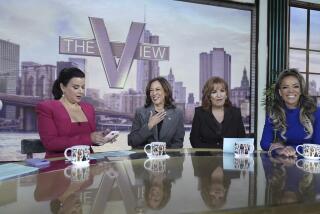The Punch and Judy Dean Show
- Share via
Diane Sawyer’s interview with Howard Dean and his wife last week was a textbook case of everything that is wrong with television coverage of politics. It reduced his campaign to the banal level of mere personality and perceived missteps, replacing issues with image -- it was a frame-up.
Out of the 96 questions that Sawyer asked, 90 were about personality and temperament and only six were even vaguely about issues; virtually all 96 were hostile and negative. Thirty-six were about Dean’s supposedly out-of-control Iowa concession speech, his alleged bad temper and the loss of momentum of his campaign. (“So did you lose your temper at [your son’s] hockey game?”) The 10-second yell in his Iowa concession speech was replayed three times during the interview, along with riffs by David Letterman and Jay Leno. (“How does it feel, to be the object of all these jokes?”)
Twenty questions were about Judy Dean’s absence from the campaign, which appeared to fault her for failing to stand by her man while at the same time criticizing the couple’s decision to be interviewed together. (“Is it because it’s a troubled time and -- and the juggernaut has hit some pothole?”) Twenty-one questions were about their family life, which all had a decidedly negative cast. (“Religion, first of all, ever a problem? Jewish? Christian?”) All the questions to Judy Dean had a shockingly sexist subtext, about her clothes and hair and whether or not she was ready for the prime-time spotlight. She was made to seem like an un-American weirdo for failing to watch her husband on TV, for failing to have cable and for receiving rhododendron plants for her birthday. (“Not exactly romantic ... “)
Throughout, the questions assumed that negative stereotypes about Dean were simple truths rather than debatable opinions. “How often does he lose his temper around you?” Sawyer asked Judy Dean at one point.
Even the paltry number of supposedly issue-related questions were really about style rather than substance. Sawyer asked four tax questions -- actually the last three were hectoring restatements of the initial question -- focusing on whether Dean had caved in to critics by changing his call for the repeal of Bush’s tax cuts to a call for tax reform. But there were no questions about whether or not it was sound policy.
There was one foreign policy question, asked twice, about Dean’s supposed gaffe in saying that the U.S. was not substantially safer after the capture of Saddam Hussein. (“So you’re saying it might in fact have been better, even if he was still in power today?”) Yet Dean had not said that Iraq was better off under Hussein; he had only questioned whether the U.S. was safer as a result of our invasion of Iraq.
When Dean tried to move the discussion to matters of substance, Sawyer inevitably pushed it back to negative fluff. (“I just want to make sure that I come back on a couple of things -- one thing, you said that -- that you decided that you’ve got to be yourself. That you’ve got to return to being what you really are.... What were you that was not who you really were?”)
Dean’s natural response should have been, at some point, to have cut Sawyer off: “Excuse me, I’m tired of answering these superficial questions. Can’t we talk about issues that matter to the American people?” Had he done so, however, it would have appeared to confirm the rap on him as a hothead. So the Deans were forced into the frame supplied by Sawyer -- a father who gets excited at his son’s hockey game can’t be trusted; a woman doctor who doesn’t watch much TV isn’t really a normal American.
Sadly, elections can turn on these kinds of characterizations. During the 2000 campaign, voters’ views of Al Gore’s honesty dropped notably after the moderator in one of the presidential debates questioned his veracity. But what was especially interesting was that studies showed that the effect was discernible not among people who had watched the debate but among those who had not. This suggests -- as Kathleen Hall Jamieson and Paul Waldman of the Annenberg School for Communication wrote in their book, “The Press Effect” -- that Gore’s reputation was damaged by the subsequent coverage, not by the debate itself. According to Jamieson and Waldman, their studies showed that the effect was limited, but, as they wrote, “in an election as close as 2000, such effects can play a role in determining the winner.”


